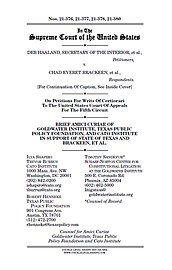Learn more about Cato’s Amicus Briefs Program.
Provisions of the Indian Child Welfare Act of 1978 (ICWA) dictate that in any custody proceeding “under State law” and involving an “Indian child,” “preference shall be given” to placing the child with “(1) a member of the child’s extended family; (2) other members of the Indian child’s tribe; or (3) other Indian families” rather than with non-Indian adoptive parents. The provisions have long roused controversy, and a Texas case called Brackeen v. Haaland affords an opportunity for the Supreme Court to strike them down and make clear that the rights of parents and children in family law cannot be made to depend on race. At the heart of this case is Andy, a young boy with two loving foster parents who wanted to adopt him. Although Andy’s birth parents agreed to that adoption, their request was denied for years because Andy is part Navajo and part Cherokee, and tribal officials invoked ICWA to block the adoption from going forward.
If Andy were of any other ethnicity, his adoption would quickly have been approved, allowing him to stay permanently with the family he has lived with for nearly his whole life. But ICWA says Texas must remove him from his foster parents because they are the wrong race—and place him instead with “Indian” adults. Remarkably, ICWA applies to kids who are not members of tribes, who have no social or cultural connection to a tribe, and who have never lived on a reservation or in Indian country, simply because a tribe’s own rules designate them as biologically “eligible” for tribal membership.
When states are required to impose differing outcomes in family law depending on race, many persons lose rights that are precious to them. As in Andy’s case, the losers may include birthparents, intending adoptive parents, and the children themselves. To make matters worse, the operation of the law has in practice tended to prevent many abused or neglected children from finding safe and loving permanent homes.
It is also relevant that ICWA encroaches on an area of law that has near-universally been the preserve of the states. In the Brackeen case, the states of Louisiana and Indiana as well as Texas have chosen to challenge ICWA.
Earlier this year, the Fifth Circuit Court of Appeals declared some aspects of ICWA unconstitutional, but left other parts in place, creating confusion about how to comply with the law. Joining Arizona’s Goldwater Institute and the Texas Public Policy Foundation in an amicus brief, Cato urges the U.S. Supreme Court to bring that confusion to an end by taking up Brackeen and striking down legal provisions that treat kids and parents differently—sometimes with tragic results—simply because of their biological ancestry and, ultimately, the color of their skin.

This work is licensed under a Creative Commons Attribution-NonCommercial-ShareAlike 4.0 International License.



